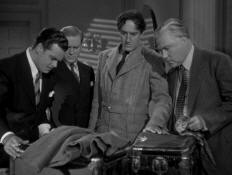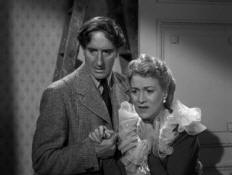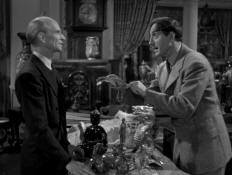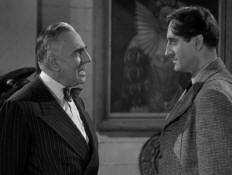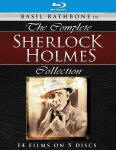Sherlock
Holmes in Washington
|
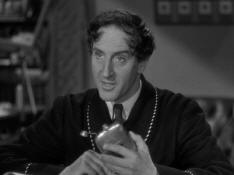 The bizarre, swept-forward hairdo is shown here. |
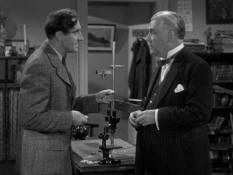 Holmes and Watson find microfilm equipment in Pettibone's home. |
Unable to find any trace of the secret document on Pettibone, the Nazi spies kill him, stuff his body in a trunk, and deliver the trunk to Holmes in Washington. The spies then turn their attention to the people with whom Pettibone mingled on the train from New York to Washington. Their logic is correct. Pettibone had lit a cigarette for a young woman (Nancy Partridge) and discreetly dropped the matchbook in her purse. The spies ransack the club car and find nothing.
Meanwhile, at an engagement party for Miss Partridge and her fiancé, the matchbook is passed from one person to another, none of whom realizes what he is holding. By the time Holmes and Watson arrive at Miss Partridge's home, she has disappeared, having been kidnapped by the Nazi spies. Holmes follows clues that lead him to an antique shop, owned by Richard Stanley (George Zucco). Stanley is in reality Heinrich Hinkle, head of a spy ring and transporter of secret intelligence.
| Sherlock Holmes in Washington BEST OF THE SERIES, THIS MELODRAMA HAS PLENTY ON THE BALL FOR THE SHERLOCK HOLMES FANS. This one looks like the best of Universal's Sherlock Holmes series. Its interest is enhanced by the fact that its action transpires in the United States amid surroundings familiar to us. The screenplay of Bertram Millhauser and Lynn Riggs is one that permits of many effective moments of melodrama and action in generous quantities. Although the outcome is never in doubt, the film a Howard Benedict production, sustains the suspense rather well under the directorial guidance of Roy William Neill. The picture makes good use of routine material and familiar tricks. Sherlock, accompanied by his trusty friend, Dr. Watson, has to make a long jump from London to Washington to get his man in his latest film exploit. His quarry is an enemy agent who runs an antique shop in the nation's capital as a blind for his nefarious activities. The center of all the fuss is a vital message from the British government to our own. The message is brought into the country on a piece of microfilm inserted in the cover of a match folder. The British secret service operator entrusted with the document is killed. Before that he disposes of the match book to a girl passenger on the train to Washington. Holmes has a merry time tracing the match folder and getting his hands on it. To increase the tenseness the item goes through a number of hands before tit is retrieved by the sleuth. Holmes' life is endangered for a time but he comes through with colors flying. The film winds up with the agent and his stooges in the hands of the authorities. Rathbone and Bruce again give good accounts of themselves as Holmes and Dr. Watson, respectively. Marjorie Lord, Henry Daniell, George Zucco, John Archer are prominent in support of the duo. DIRECTION, Okay. PHOTOGRAPHY, Good. —The Film Daily, 31 March 1943 |
While Watson goes to fetch the police, Holmes attempts to rescue Miss Partridge. He allows himself to be captured by Stanley, whom he recognizes as the "head of the most insidious spy ring that ever existed." Holmes notices that Stanley has the matchbook in hand, unaware that it is anything other than an ordinary matchbook. Holmes says to Stanley that the man who has the document doesn't know it. Stanley mistakenly thinks Holmes is implying that Senator Babcock (another train passenger who spoke with Pettibone) has the document. Watson and the police arrive to save Holmes and Miss Partridge, and apprehend some of the spies, but in the ensuing fracas Stanley, with the matchbook in his pocket, escapes through a secret passageway.
Having correctly deduced that Stanley would head for Senator Babcock's office, Holmes meets him there and captures him. Holmes retrieves the matchbook and triumphantly pulls the microfilm out of the cover.
The final scene in the film is of Holmes and Watson driving down Pennsylvania Avenue, heading back to London. Holmes makes the usual patriotic speech, this one quoting Winston Churchill, from a speech he made in the U.S. Capitol:
"It is not given for us to peer into the mysteries of the future. But in the days to come, the British and American people for their own safety and the good of all will walk together in majesty and justice and in peace."
| Sherlock Holmes in Washington with Basil Rathbone and Nigel Bruce Although somewhat far-fetched, this third in the series of modernized "Sherlock Holmes" detective melodramas should easily satisfy the followers of such type of entertainment. This time the master sleuth visits Washington where, with his amazing powers of deduction, he locates a lost state document of vital importance, and prevents its theft by enemy agents. The fact that the audience knows from the beginning in whose possession the document is, gives the story a nice twist. One's interest, therefore, is held in watching the methods employed by Holmes to find it. Basil Rathbone gives his usual good portrayal of Holmes, and Nigel Bruce, as Dr. Watson, his aide, provokes many laughs with bright bits of dialogue. Sherlock Holmes (Basil Rathbone) and Dr. Watson (Nigel Bruce) fly to Washington to solve the disappearance of an important document, which had been stolen by spies from a British operative, who had mysteriously vanished after the theft. Holmes learns that, before leaving England, the operative had photographed the document on microfilm, and had inserted the negative within the cover of a folding match book. Holmes' investigation discloses that the agent had vanished soon after leaving a New York-to-Washington train, and that, without revealing its importance, he had casually given Nancy Partridge (Marjorie Lord), a fellow passenger, the match book. When the operative is found murdered, Holmes deduces that he had not revealed the whereabouts of the document. Meanwhile the spies, still hunting for the document, narrow down their search to Nancy and Senator Thurston Hall, the only persons to whom the operative might have given the document. Learning that Nancy was to be present at a reception in her honor, the spies go there and kidnap her. Holmes' search for the girl leads him to the antique shop of Richard Stanley (George Zucco), and enemy agent. Stanley had come into possession of the match book, but had no idea that it contained the photographed document. Holmes is made Stanley's prisoner, but he, together with Nancy, gains freedom with the arrival of the police led by Dr. Watson. After a gun battle, Stanley escapes. Holmes gives chase, and locates him in the office of Senator Hall, where he had gone in search of the document. As Stanley is led away by the police, Holmes asks him for a match. Handed the book of matches, Holmes slits open the cover and removes the microfilm. Bertram Milhauser and Lynn Riggs wrote the screen play, Howard Benedict produced it, and Roy William Neill directed it. The cast includes John archer, Don Terry, Edmund MacDonald, Bradley Page, and others. Morally suitable for all. —Harrison's Reports, 3 April 1943 |
The third film of the Universal series of Sherlock Holmes films (working title Sherlock Holmes in the USA) began filming in July 1942. The film was shot in 15 days, and was completed towards the end of 1942. The studio delayed the release until April 30, 1943.
The story, written by Bertram Millhauser, did not use a Doyle story as its basis. Lynn Riggs was brought in to put the finishing touches on the screenplay.
Basil Rathbone was under contract to MGM when Universal made plans to bring a series of Sherlock Holmes films to the screen. Universal borrowed Rathbone from MGM for a negotiated fee of $20,000 per film. In his book Sherlock Holmes and the Fabulous Faces, author Michael Hoey writes, "Most likely this money went to MGM to offset whatever they were paying Rathbone at that time." Hoey also writes that for some unknown reason, Rathbone's salary for Sherlock Holmes in Washington was reduced to $16,666. Nigel Bruce was paid $5000.
Although the budget for the film was $150,000, records show that the actual expenses totaled $138,365.47 (per Sherlock Holmes and the Fabulous Faces).
The film featured approximately fifteen different locations, all of the exteriors (except airport scenes) were filmed on Universal's back lot. Newsreel footage of Washington DC was used in the film.
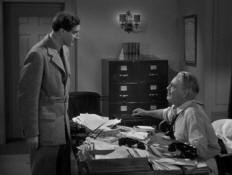 Holmes warns Senator Babcock about Stanley. |
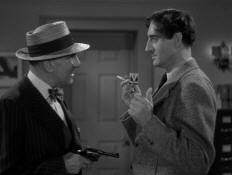 Stanley pulls a gun on Holmes but doesn't realize that Holmes is holding the microfilm |
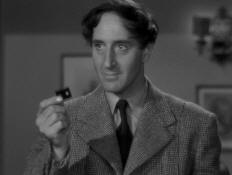 The microfilm! |
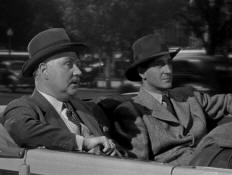 Driving down Pennsylvania Avenue |
Excellent performances were given by the villains: George Zucco as Stanley and Henry Daniell as Easter. Both of these actors played Moriarty opposite Basil Rathbone: Zucco in The Adventures of Sherlock Holmes (1939), and Daniell in The Woman in Green (1945). Rathbone gives his usual inspired performance, and is especially impressive as the eccentric collector in the antique shop.
The role of Nancy Partridge was played by Marjorie Lord, who may be better remembered as Danny Thomas's wife in Make Room for Daddy. Marjorie Lord was married to John Archer, who played her fiance in this film. Their daughter, Anne Archer, also became an actor.
Universal casting directors originally assigned Robert Paige to play the romantic lead in Sherlock Holmes in Washington, opposite Marjorie Lord. When the movie went into production, however, Paige was removed for another role in a different picture. To avoid production delay, John Archer, freelance leading man, was rushed in for a test and signed. According to the Sherlock Holmes in Washington press book, the casting office discovered only after the contracts were drawn up, that John Archer and Marjorie Lord were husband and wife. Sherlock Holmes in Washington was their first opportunity to play together.
Sherlock Holmes fans will likely recognize the actor who played the unfortunate Mr. Pettibone—Gerald Hamer. Hamer also appeared in Sherlock Holmes Faces Death (1943), The Scarlet Claw (1944), Pursuit to Algiers (1945) and Terror by Night (1946).
Holmes Herbert, who played the part of Mr. Ahrens of the British War Office, was in several of the Rathbone/Bruce Sherlock Holmes' films, including The Adventures of Sherlock Holmes (1939), Sherlock Holmes and the Secret Weapon (1942), Sherlock Holmes in Washington (1943), The Pearl of Death (1944), The House of Fear (1945), and Dressed to Kill (1946).
Other actors who have appeared in several Sherlock Holmes films, in addition to Sherlock Holmes in Washington, include:
- Gavin Muir: Sherlock Holmes and the Voice of Terror (1942), Sherlock Holmes Faces Death (1943), The House of Fear (1945)
- Ian Wolfe: The Scarlet Claw (1944), The Pearl of Death (1944), Dressed to Kill (1946)
- Frederick Worlock: Sherlock Holmes Faces Death (1943), The Woman in Green (1945), Pursuit to Algiers (1945), Terror by Night (1946), Dressed to Kill (1946)
- Leslie Denison (airplane pilot): Sherlock Holmes and the Voice of Terror (1942), Sherlock Holmes and the Secret Weapon (1942), The Pearl of Death (1944), The House of Fear (1945), The Woman in Green (1945)
.
See more photos and reviews on Page Two. See Posters, Lobby Cards and Promo Photos on Page Three!
|
.
| Images on this page and pages 2 and 3 are from the film Sherlock Holmes in Washington. | Sherlock Holmes in
Washington is available on DVD: Click to order |
DVD also available as part of The Sherlock Holmes
Collection, Volume 1: Click to order |
blu ray |







